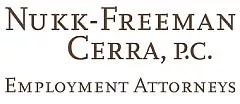On September 29, Governor Newsom signed into law AB2499, enacting a sweeping set of changes to California's "jury, court, and victim time off" law, with the most significant amendments expanding the scope of protection under the "victim time off" provisions. AB2499 reframes existing workplace protections for victims of violence by redefining eligibility for protection and broadening the list of qualifying reasons to take protected leave. AB2499 also transfers and recasts the jury, court, and victim time off provisions – currently housed under the Labor Code – as unlawful employment practices within the California Fair Employment and Housing Act ("FEHA"). As a result, AB2499 will be enforced by the Civil Rights Department ("CRD") which, effectively, will allow aggrieved employees to bring civil actions in court.
To understand this complex law and how it may impact your workplace, take some time to review the highlights below.
Background
Generally, existing law prohibits employers from discriminating or retaliating against an employee based on their status as a victim of crime or abuse, or for taking time off to serve jury duty, or to comply with a subpoena or other court order as a witness in a judicial proceeding. Employers with 25 or more employees are also prohibited from discriminating or retaliating against an employee, who is a victim of crime or abuse, for taking time off for the following: to seek medical attention for injuries related to the crime or abuse; to obtain services as a result of the crime or abuse; or to participate in actions to increase safety from future incidents of crime or abuse. While these protections remain in place, AB2499 broadens eligibility and qualifying reasons to take victim time off; permits employees to use paid time off during the leave, including vacation or sick leave; expands eligibility for reasonable accommodations; and lowers the 25-employee threshold for certain victim-related provisions.
Effective January 1, 2025, AB2499 makes the following changes:
Qualifying Acts of Violence
AB2499 redefines "victim" as an individual against whom a "qualifying act of violence" ("QAV") is committed. The term QAV, which replaces the term "crime or abuse," is defined to include the following, regardless of whether there has been an arrest, prosecution, or conviction:
- Domestic violence;
- Sexual assault;
- Stalking; or
- An act, conduct, or pattern of conduct in which an individual (1) causes bodily injury or death to another, (2) exhibits or uses a firearm or other dangerous weapon against another, or (3) uses or makes a reasonably perceived or actual threat against another to cause physical injury or death.
Family Members
AB2499 also extends certain protections to employees who have a "family member" who is a victim of a QAV. The definition of "family member" includes:
- A child, parent, grandparent, grandchild, sibling, spouse, or domestic partner; or
- A "designated person" who is blood-related or whose association with the employee is equivalent to a family relationship. Notably, the law limits employees to one designated person per 12-month period for leave.
Prohibitions on Discrimination and Retaliation (all employers)
AB2499 prohibits an employer with one or more employees from discriminating or retaliating against an employee for taking time off to serve jury duty; to comply with a subpoena or other court order as a witness in a judicial proceeding; or to obtain relief from a QAV, including obtaining a restraining order or injunctive relief to ensure the health, safety, and welfare of the victim or their child.
Additional Requirements (employers with 25 or more employees)
Employers with 25 or more employees also are prohibited from discriminating or retaliating against an employee who is a victim of a QAV, or whose family member is a victim, for taking time off to:
- Assist a family member in obtaining relief, including restraining orders or other injunctive relief to ensure the health, safety, or welfare of the family member;
- Seek, obtain, or assist a family member to obtainmedical attention for or to recover from injuries caused by a QAV;
- Seek, obtain, or assist a family member to obtain services from victim services organizations or agencies;
- Seek, obtain, or assist a family member to obtain mental health services related to a QAV;
- Participate in safety planning or other actions to increase safety from future acts of QAV;
- Relocate or engage in the process of securing a new residence due to the QAV, including securing housing or enrolling children in a new school or childcare;
- Assist a family member in their recovery from injuries caused by a QAV;
- Seek, obtain, or assist a family member to obtain legal services related to a QAV;
- Prepare for, participate in, or attend legal proceedings related to a QAV; or
- Seek, obtain, or provide care for a child or adult that is necessary to ensure their safety as a result of a QAV.
If feasible, employees taking time off for a QAV-related reason must provide the employer with reasonable advanced notice of their intent to take time off. However, employers may not take action against an employee for unscheduled time off if, within a reasonable time after the absence, the employee provides certification to the employer upon request, which may include a police report, court order, documentation from a medical professional or counselor, or any other document that reasonably verifies that the QAV occurred, including a signed, written statement from the employee certifying the absence was due to a QAV.
Reasonable Accommodations
Employers must provide reasonable accommodations for an employee who is a victim of a QAV, or whose family member is a victim of a QAV, if (1) the employee disclosed their status or their family member's status as a victim of a QAV, and (2) the employee requests an accommodation for safety reasons. An employer is not required to provide accommodations if it would impose an undue hardship on the business operations, including any act that would violate the employer's duty to maintain a safe workplace for all employees.
Examples of reasonable accommodations include:
- Work transfers or reassignments;
- Modified schedules;
- Changed workstation or telephone;
- Permission to carry a phone at work;
- Lock installation;
- Assistance with documenting a QAV;
- Adjustments to the workplace facility or work requirements; or
- Referrals to victim assistance organizations.
Employers must engage in a timely, good faith, and interactive process to determine effective accommodations, which must include consideration of any exigent circumstance or danger facing the employee or their family member. Upon the employer's request, an employee requesting an accommodation must provide a signed, written statement certifying the employee's status, or their family member's status, as a victim of a QAV.
Paid Sick Leave and Permissible Time Off
AB2499 permits employees to use vacation, personal leave, sick leave, or other compensatory time off during the leave. If the leave is provided as a reasonable accommodation and would qualify under the Family and Medical Leave Act or the California Family Rights Act, the leave must run concurrently. An employer may limit the total leave taken as follows:
- If the employee is the victim of a QAV, leave may be limited to 12 weeks.
- If the employee's family member is the victim of a QAV, leave may be limited to 10 days.
- If the employee's family member is the victim of a QAV and needs assistance to relocate or secure a new residence, leave may be limited to five days.
Notice Requirement
Employers must provide notice to employees informing them of their rights under the law upon hire, annually, at any time upon request, and any time an employee informs an employer that the employee or their family member is a victim of a QAV. The notice requirement is not effective until the CRD publishes the form on its website on or before July 1, 2025. Employers may use the CRD's form or create their own, in which case, it must be substantially similar in clarity and content to the CRD's form.
The content of this article is intended to provide a general guide to the subject matter. Specialist advice should be sought about your specific circumstances.



